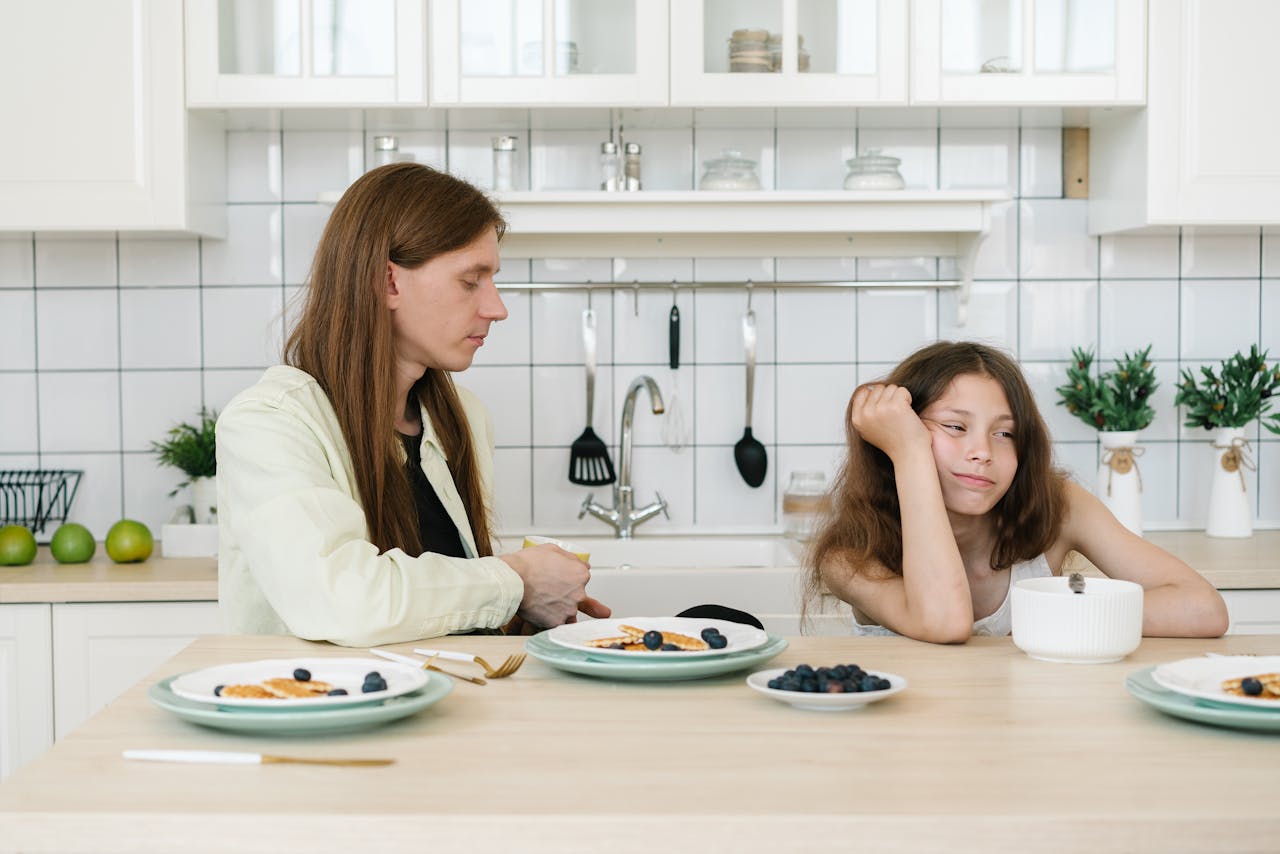Becoming a step-parent starts when you fall in love with a person who has children. Love is a powerful thing. Maybe you’re suddenly and whole-heartedly ready to be there for your partner’s kids. Maybe you’re nervous about suddenly becoming a parent but you’re willing to try. Perhaps you have kids of your own and the step-parent relationship will go both ways.
While you’re getting ready to be the best step-parent you can be, it’s also important to know what not to do. Readiness to be a good parent is a wonderful thing. But child development and the parent-child relationship are delicate.
There are things a step-parent should never do. New stepparents often have a hard time with their stepkids, despite their best efforts to build a new kind of family. It’s important to know how to step carefully into the step-parent role by knowing the behaviors to avoid. This is the best route to building a healthy family with positive relationships all around.
Let’s dive into the 10 things a step-parent should never do.
Understanding the Role of a Step-Parent
The first thing to know is that you’re not alone. Approximately 20% of US households have at least one step-parent, so this road is well-traveled. That means there are many good and bad examples that you can draw on. The things a step-parent should never do are balanced by positive ways to become a trusted adult in the lives of your partner’s children.
Building a step family, whether you’re a stepmom or a stepdad, relies first on trust and a positive family life in each household.
The Importance of Boundaries
The first and most important thing a step-parent should consider is boundaries. It’s a good idea to set limits from the very beginning. Healthy boundaries can help you integrate more comfortably with your new spouse, their children, and even your own kids. Step families introduce a whole new world of family members and family dynamics, but without time to build that lifelong foundation of trust or lifelong understanding of one another’s limits.
Setting initial boundaries gives you time to get to know each other without overstepping the bounds of emotion or privacy.
👉 Divorce is tough, and co-parenting can be challenging. Learn effective strategies to make it work for your kids by reading our article, “How to Co-Parent: 5 Simple Strategies for Success.”
Step Parent Boundaries
There are several specific step-parent boundaries that will help you begin building a healthy new family life in a blended family.
- Emotional boundaries: Everyone is allowed to feel how they feel. Remember, your step-kids may still be struggling with the aftermath of a divorce, the uncertainty of a new adult in their lives, and the usual turmoils of childhood and adolecence. Just as you and your new spouse may be madly in love whether or not the kids are ready to see it.
- Privacy boundaries: Privacy can be very important in a blended family where now-relatives are new to each other. Closed doors, locks, and knocking protocols are all critical so that everyone is able to feel comfortable in their own space.
- Parent-child boundaries: Kids feel a strong connection to their own parents and probably aren’t ready to dive into a new parent-child relationship without a lot of trust building first.
- Discipline boundaries: In blended families, parents often take responsibility for disciplining their own children.

Credit: Pexels
Step Parents Overstepping Boundaries
Step-parents should avoid overstepping boundaries to maintain household harmony. Overstepping important boundaries are among the things a step-parent should never do.
The biggest risk is taking on the role of a child’s trusted lifelong parent. The biggest risk of step-parents overstepping boundaries are emotional and trust boundaries reserved for a bio-parent. This can cause family issues, encroach on the position of your partner’s ex, trigger issues involving the parents’ divorce, and even frighten your step-kids.
Examples:
- A step-mom asks their step-kids to open up emotionally with them before earning trust.
- A step-dad enacts strict discipline, enforcing all-new rules that feel like random harsh punishment to the kids.
- A step-parent tries to replace their partner’s ex as the mom or dad in traditional activities.
- A step-parent gives frequent unwanted hugs before the child is comfortable.
How To Be a Step Parent vs. How To Be a Good Step Parent
The basics of how to be a step parent include providing supervision, meals, and emergency response. If you can babysit you can “be a step-parent”. However, there’s a big difference between just being a nearby adult for your partner’s children and being a good step-parent.
Being a good step-parent means putting the family’s harmony and happiness before your own personal desires. Maybe you want to become a trusted parental figure and role model. Maybe you want your step-kids behavior to change to fit your ideals of a happy family. But first, you have to build trust. Be there for everyone. Be supportive, kind, and offer advice before you enforce new rules.
Being an exemplary step-parent means building the relationship you want to have instead of just stepping in and expecting your step-kids to magically see you as a lifelong trusted parent. Be a good role-model. Show affection and support to your spouse at home, don’t bad-mouth their other bio-parent, and become a trusted member of the family before you expect to become a parental figure. Knowing the things a step-parent should never do will help you choose the right path.
Let the family’s relationships grow organically and you’ll build a better long-term relationship with your step-kids based on who they are, not who you want them to be.
10 Things a Step-Parent Should Never Do
The good thing about the high percentage of step-parent families is you have a ton of examples to follow – and not follow. It’s easy to find examples of the most common mistakes step-parents make and which ones are things a step-parent should never do.
You may have experiences of your own, remember watching your friends at school go through the step-parent ordeal, or have adult friends who have become step-parents. You’ve probably seen good and bad examples, and you’ll probably recognize the following ten mistakes – as well as why these are things a step-parent should never do.
The following ten things should be avoided at all costs to help you build a healthy blended family dynamic.
Mistake 1: Trying To Replace the Biological Parent
What should a stepparent never do?
First, never try to “replace” a biological parent. The healthiest blended families have “bonus parents” instead of replacement parents. Well-adjusted children in blended families will happily talk about how they have two moms and two dads, sometimes up to eight grandparents, and even a rambling extension of blended family. There is planty of room in the hearts of your step-kids for another mom or dad. You can become a trusted parental figure without actually trying to replace their parent.
Why is this a “never” for step parents? Because actually trying to replace a child’s biological parent will cause distrust and even a rift in the family you are trying to build. Child development is strongest when a child has a good relationship with both biological parents. They need to know that both their mother and father love them. You can’t replace either bio-parent relationship, but you can become a new trusted parent.
Mistake 2: Ignoring the Importance of Boundaries
Second, respect the boundaries set by your new partner, the boundaries requested by their children, and the boundaries you establish as a family. Healthy boundaries are important for step-parenting because they give everyone time, space, and a sense of safety as you get used to each other. Boundaries make everyone feel safe. They give your step-kids space to process their feelings about the divorce and their mom/dad’s new relationship.
Boundaries ensure everyone maintains their privacy, has a place to retreat when they are upset, and that each person’s emotions and existing family relationships are respected.
Respect both basic boundaries (physical, emotional, etc) and personally requested boundaries (ex: “don’t ask me about that”/ “don’t go in my room”) so that everyone feels safe.
Mistake 3: Forcing Relationships
You can’t rush a relationship. You already know that you can’t force a real friendship or a romantic relationship. The parent-child relationship isn’t any different. Trying to force a parental bond can backfire and drive your step-kids further from trust.
How can a step-parent build a good relationship with stepchildren? The key is to build trust slowly over time. Be there for them. Support the family unit. Be a friend and source of stability. Become an affectionate caregiver for young children without trying to replace a parent. Become a trusted source of advice and car rides for adolcents. The bond of trust and the potential for some version of the parent-child relationship will come naturally over time.
Mistake 4: Taking Sides in Conflicts
Avoid taking sides in a family conflict. Conflicts between your partner and their ex or between your step-kids and biological children should always be handled with neutrality. If you want your step-kids to trust you, then it’s important to be a neutral party when it comes to family drama.
It can be tempting to take sides, but this only leads to further conflict. You might accidentally become the role-model for taking sides instead of working together to create a happy blended family.
Try to help your partner facilitate their co-parenting plan. Become a force of peace instead of an agent of conflict in the household and your stepkids are more likely to rely on you in the future.

Credit: Pexels
Mistake 5: Criticizing the Biological Parent
A number-one rule during divorce is to never bad-mouth the ex to the kids. That rule extends to step-parents after the remarriage. Criticizing your step-kids’ biological parents is one of the things a step-parent should never do.
This goes back to the importance of a child’s strong relationship with both parents, even when times are tough. Never make yourself the “bad guy” against a child’s biological parents, even if their relationship is on the rocks. If your step-kids are mad at one or both bio-parents, you can express sympathy and offer alternate activities with yourself as a supportive neutral grown up, but criticizing a bio-parent can have unwanted impact on the children and family dynamic.
Mistake 6: Neglecting Your Partner’s Input
As a step-parent, it’s important to let your partner take the lead on how to parent their own kids. They probably know more about the children’s individual needs, personalities, and quirks than you. They have established lifelong behavior expectations and created patterns that are core to each child’s sense of stability. If you go steam-rolling through that and parenting without your partner’s input, unforeseen negative consequences are the inevitable result.
Instead, work together to form a unified parenting strategy. Share parenting tips and adapt your own idea of parenting based on your partner’s established parenting style. This will help create a more harmonious family, strengthen your bond with your partner, and help the children see you as a supportive new adult instead of a foreign and unwanted new authority.
Mistake 7: Imposing Strict Discipline
Never over-discipline your step-kids. Strict discipline is one of the major things a step-parent should never do.
Discipline from parent to child is built on trust. Children respond to discipline from their parents because of the lifelong care and protection that is part of their relationship. You will seem like an unknown tyrant if you suddenly start making and strictly enforcing new rules or make yourself the source of discipline in the household without first building trust – and building a logical structure of consequences.
It is very important to find the appropriate balance between authority and affection when becoming a parental figure to children who you did not raise from infancy.
Mistake 8: Overstepping Financial Boundaries
Financial boundaries can be complicated in a blended family. People often have a “territory” regarding who pays for their children’s expenses. Maybe Dad always pays for summer camp. Maybe Mom always buys the school dance outfits. Co-parenting complicates things further as household expenses become the responsibility of one parent or the other. Paying for the wrong thing can unfortunately be seen as trying to replace a parent, even if that wasn’t your intent.
There are probably even a few financial boundaries you don’t know about and couldn’t even guess. Your best bet is to consult with your spouse before you start to spend on the step-kids beyond groceries.
Mistake 9: Expecting Instant Love and Affection
Trust, love, and affection grow over time. Once in a blue moon, a young child will quickly bond with a step-parent. But these hallmark moments are not the norm. Most of the time, step-kids are still emotionally injured by the divorce and are not ready to trust a new partner or parental figure. And that’s OK. Expecting instant love and affection is some thing a step-parent should never do.
Instead, look at your step-children as people whose trust and affection you must earn, and those who might have difficulty trusting due to their own emotional journey. Your best route is to be kind and patient while respecting boundaries as your step-kids get used to the idea that you could be a trusted part of their life. Love and affection come after that.
Mistake 10: Ignoring Self-Care
Lastly, don’t let the stress or anxiety of building a new family cause you to neglect yourself. Remember, even before you earn trust, you are still an instant role model. Taking care of yourself is essential for building and maintaining a healthy family environment.
Provide a good example of self-respect, self-determination, and self-care in the face of family life challenges. Ideally, your step-children will be inspired to do the same and maintain good self-esteem as they allow a new family dynamic to grow organically.
👉 Conflicts over raising kids are common, whether it’s with the biological parent of your children or your current spouse, the step-parent. Discover how to manage them by reading our article, “Strategies to Stop Fighting With Husband Over Parenting.”
Recognizing Toxic Step-Parent Behavior
What is toxic stepparent behavior? There are many examples of toxic step-parent behavior. But most importantly, each example is unique. What is toxic in one family might be fun in another, and vice versa. Maybe mocking jokes are a bonding point in one blended family, but are abusive in another. Maybe hugs and comfort are what is needed in one family, but overstep boundaries in another.
The key is to identify toxic step-parent behavior and avoid it wherever possible. Gague the comfort level of your step-kids at all times. If something you do doesn’t go over well, back up and try a new strategy. If hugs aren’t welcome yet, try a shoulder pat or even a formal handshake instead. If a joke causes anger or tears, apologize and tread more lightly with a step-child who is still emotionally tender.
Not being toxic is about respecting the needs and boundaries of your partner and their kids. The key is to maintain everyone’s mental health and build healthy relationships by carefully determining what is and is not toxic in your situaiton.
Strategies for Building Positive Relationships With Stepkids
How can you build positive relationships with your stepkids? When every family is unique, what are the best strategies for being a good stepparent at all times?
Patience and Persistence
Be prepared to build your relationships gradually with patience and persistence.
- Wait out tantrums and speak calmly during ‘fights’;
- Express respectful affection and support without respecting affection in return;
- Provide encouragement and daily positivity;
- Pass “tough situations” on to your partner, when appropriate;
- Respect boundaries and maintain your boundaries in return;
- Positively welcome outreach when it happens.

Credit: Pexels
Communication and Transparency
Keep the channels of communication open. Talk often with your partner and build parenting strategies together. Hold conversations with your step-children, sharing your perspective and inviting their opinions to help build that initial foundation of connnection.
Be transparent when something bothers you and ask your step-kids to share when they are bothered. But also open the way for special requests, celebrations, and sharing personal victories together.
Seeking Professional Help When Needed
It’a also always OK to work with counseling and family therapy when times get tough. If one of your step-kids is having emotional or behavior problems, if your spouse is struggling with depression, or if you personally are having trouble adapting, a professional can help you overcome these hurdles and take another step toward building a happy blended family.
Becoming the Step-Parent You Want to Be
Being a good step-parent starts with the basics: baby sitting and supportiveness. Then you learn the things you should never do as a step-parent. Over time, you learn the special things that each of your stepkids needs to feel connected and build trust. Because each person and family will be unique, it’s important to build your strategy based on just a few absolutes and then adapt as needed.
Fortunately, with this list of things a step-parent should never do and teamwork with your partner to find the right path, you can become the great step-parent you hope to be. Building a successful blended family takes time and effort. With work, you can build a new foundation of trust and respect with your step-kids.
If you want to find out how to be a good step parent, enroll in one of our parenting masterclasses. Discover essential parenting techniques and build a loving, healthy family. Do you have any parenting questions? Ask Sophie, our AI parenting expert—she’s here to answer all your questions!
References
AlHarbi, N. (2022). Self-Esteem: A Concept Analysis. Nursing Science Quarterly, 35(3), 327 – 331. https://doi.org/10.1177/08943184221092447
American Psychological Association & National Association for the Education of Young Children. (2001). Violence Prevention for Families of Young Children [Brochure]. American Psychological Association
McGarvey, S. & Leon, K. (April, 2007). Family Councils: The Key is Communication. University of Missourri Extension. https://extension.missouri.edu/publications/gh6641
Spyrou, S. (2011). The limits of children’s voices: From authenticity to critical, reflexive representation. Childhood, 18(2), 151–165. https://doi.org/10.1177/0907568210387834
Yoshida, S., & Funato, H. (2021). Physical Contact in parent-infant relationship and its effect on fostering a feeling of safety. IScience, 24(7), 102721. https://doi.org/10.1016/j.isci.2021.102721









